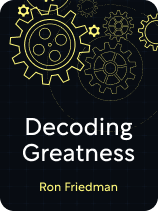

This article is an excerpt from the Shortform book guide to "Decoding Greatness" by Ron Friedman. Shortform has the world's best summaries and analyses of books you should be reading.
Like this article? Sign up for a free trial here.
Why are the greats often not so great at teaching others what they know? What’s the best way to learn from them?
In Decoding Greatness, Ron Friedman says that doing great work requires learning from the greats in your field. But, you’ll find that many of them make poor teachers and coaches. Friedman explains why this is and shares strategies for getting the most out of your interactions with them.
Keep reading for Friedman’s guidance on how to learn from experts.
Learning From Experts
As you work to grow your skills and expand your creative output, it’s crucial to learn from experts, but it’s not always easy to get their feedback and guidance. Friedman notes that, if you’re lucky enough to get a chance to work directly with experts in your field, they might not be as helpful as you’d hope. He explains that experts often make poor teachers, trainers, and coaches. This is because they’ve so internalized their knowledge and skills that, when they perform, they do so instinctively. That makes it hard for them to explain how they do what they do. Moreover, Friedman says, experts typically can’t remember (or imagine) what it’s like to be a beginner and lack the skills and knowledge they have now.
(Shortform note: If you’re looking for experts who are good teachers, Think Again author Adam Grant suggests that you look for people who gained their expertise recently, who struggled to do so, and who are good communicators—these people tend to remember what it was like to face beginner challenges and have the skills needed to guide learners toward improvement.)
That said, if you have the chance to work with an expert, Friedman suggests that you make the most of their expertise by asking:
- How they got where they are: What practices and strategies did they find most (and least) helpful?
- How they do what they do: Have them spell it out, step by step.
- What they learned along the way: What do they wish they’d known when they started out?
As the conversation unfolds, Friedman says, don’t be afraid to ask them to elaborate on their answers or to ask for clarification if you don’t understand something they’ve said—experts don’t always realize when they’re using specialized language or breezing over complex ideas. If you’re confused, Friedman suggests that you ask for concrete examples or try repeating back complex ideas in your own words to check your understanding.
(Shortform note: Friedman’s advice assumes that you have the chance to actually talk one-on-one with experts in your field, which might not always be possible. But there are still ways to learn from experts even if you don’t have a chance to interact with them. For example, in Peak, Anders Ericsson recommends that you model your behaviors after the habits and practices of the experts in your field. To do so, start by conducting research to answer the questions you can’t ask in person: For example, biographies, profiles, and interviews might help you piece together an expert’s path to success, their favorite working methods, and some of the lessons they’ve learned in their career—all of which you can emulate in your own practice.)

———End of Preview———
Like what you just read? Read the rest of the world's best book summary and analysis of Ron Friedman's "Decoding Greatness" at Shortform.
Here's what you'll find in our full Decoding Greatness summary:
- The secret shortcut to elite performance and creative innovation
- How to reverse engineer someone else's work to create your own
- How to lower the stakes of failure by mitigating your creative risks






